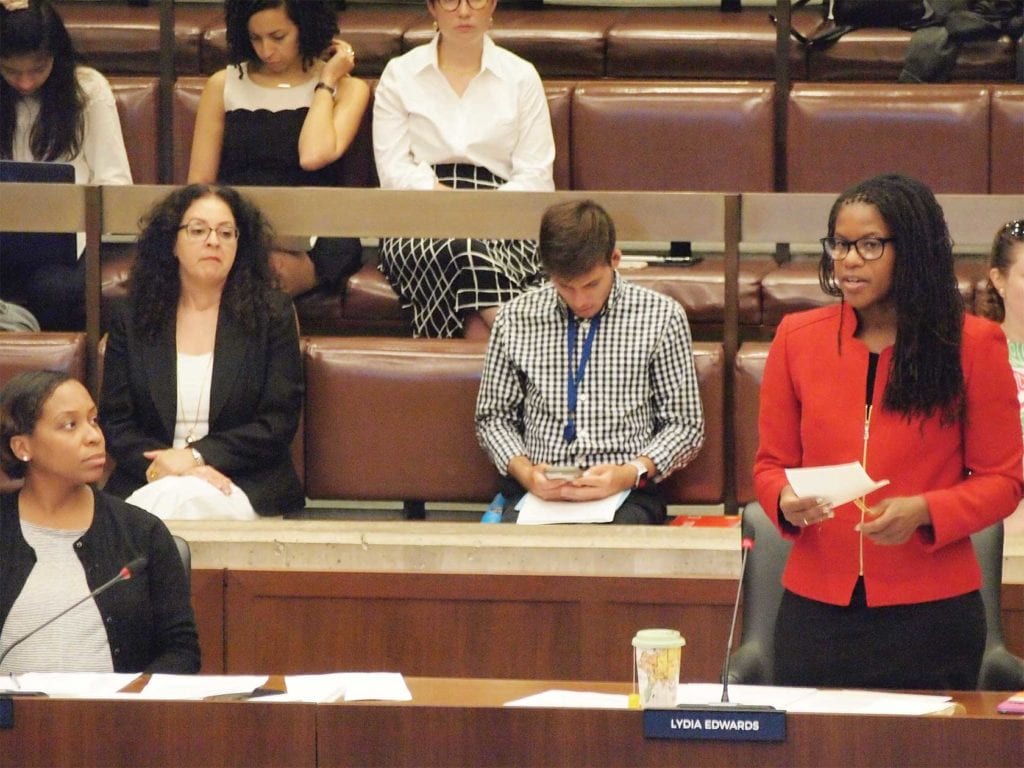
The Boston City Council passed Mayor Martin Walsh’s $3.49 billion budget last week, with 10 members voting in favor of the $1.1 billion Boston Public Schools portion of the budget and councilors Andrea Campbell, Lydia Edwards and Michelle Wu voting against it.
The BPS budget includes measures for which the Boston Teachers Union fought, including 2 percent pay raises for staff and funding for a full-time nurse in every classroom. The overall 5 percent budget increase for the schools is on par with increases in the city’s budget in recent years.
Yet, as Edwards noted, the district’s weighted student funding formula, which ties funding to the number of students in a school, has led to $2.6 million in cuts for schools in East Boston.
“If a budget is a reflection of the values of a government, then it’s very clear that BPS does not value District 1 schools,” Edwards said during last week’s meeting.
Edwards, who represents East Boston, Charlestown and part of the North End, said the loss of students in East Boston schools is largely due to what she called a “displacement crisis,” where low-income, predominantly Latino families are being forced to move to other neighborhoods or cities as developers force out longtime tenants and drive up rents.
“The weighted student formula does not account for the displacement that a community is dealing with,” she said. “You cannot simply look at who is not there and then cut the budget. And then say displacement has no impact.”
While the district provides “soft landing funds”—funding to lessen the impact of cuts that stem from falling enrollment—Edwards said the measure only reduced the number of teacher layoffs at East Boston High School off from 15 to 13.
“I don’t call that soft,” she said. “I call that ignorance. I call that dismissive of our largest high school. And I cannot support that.”
Campbell cited what she says is a lack of equity in the system and said money alone won’t solve the district’s problems.
“I do not think we are demonstrating the values of equity, transparency and accountability by merely adding money to our budget and celebrating that this is the highest BPS budget in the history of the city of Boston,” she said.
Campbell also cited the “skyrocketing” transportation budget and the cost of central office staff in her opposition budget, and lack of access to seats in top-tier schools in low-income communities, including in her Mattapan neighborhood.
Students living in Mattapan have a 5 percent chance of attending a top-tier school, while those in downtown neighborhoods have an 80 percent chance, she said.
“In Boston we must commit to the idea that those who have the least deserve the most from our public schools,” she said. “We haven’t done that. This budget, and programming attached to it, with the lack of accountability, has not demonstrated that. That tells me something is terribly wrong in a system. Until a budget or a plan addresses that, I can’t support it.”
Wu, too, cited inequities in the system, noted that she has visited most of the high schools in Boston.
“It is heartbreaking, the inequities across the system. It is devastating, some of the conditions our students, teachers and school communities have to face day after day,” she said.
The cuts that Edwards decried are not limited to East Boston schools. Others, including the Blackstone in the South End and the Winthrop in Dorchester faced cuts as well, while many others saw their budgets level-funded or received increases inadequate to meet rising costs.
The BTU’s push for more nurses and counselors blunted some of the early opposition to this year’s budget, but not by those whose schools are facing deep cuts.
“This budget is embarrassing. It is wrong. And while it may be the largest budget for BPS, it is the largest cuts for my district,” Edwards said during last week’s meeting. “I cannot turn back to my constituents and the people I represent and say I support this budget.”







